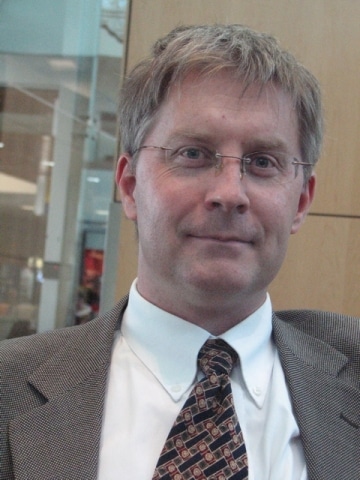Canadian climate denier Ross McKitrick has officially taken over as chairman of the academic advisory council of Lord Lawson’s controversial climate denying charity, the Global Warming Policy Foundation (GWPF).
The Economics professor is also a Senior Fellow of the Koch-and Exxon-funded Fraser Institute, a libertarian think tank based in Vancouver, British Columbia.
McKitrick succeeds British economist David Henderson, 87 – the man responsible for inspiring Lawson’s climate scepticism over a decade ago.
Henderson, who stepped down at his own request on 1 January 2015, had been chairman since the GWPF’s inception in 2009. Prior to that he was the head of the Economics and Statistics Department at the Organisation for Economic Cooperation and Development (OECD) from 1984 to 1992.
A visiting professor at the Westminster Business School, Henderson is also an advisory council member of free market think tank, the Institute of Economic Affairs.
Lawson’s Inspiration
Lawson and Henderson knew each other long before they started talking about climate change. This fateful conversation would begin at the end of 2004 when Lawson revealed his interest in climate change during a lecture at the London School of Economics.
As Lawson recalls: “I said there were two issues … that really did not come across my desk at the time I was Chancellor in 1989 which are now two big issues, which were the European Monetary Union and climate change, global warming. And, I made an illusion that I was rather concerned that the climate change issue was not being analysed in economic terms and this whole dimension appeared to be missing and concerned me.
“After that, David Henderson, who I had known for many years, who had been taking an interest in the subject for some time, starting talking to me about this,” he explains.
So much of an inspiration was Henderson that Lawson even dedicated his book, An Appeal to Reason: A Cool Look at Global Warming, to him. It reads: “To David Henderson, who first aroused my interest in all of this.”
Henderson also knew McKitrick in the lead up to the GWPF’s debut. In 2007, he spoke alongside the Canadian at the Fraser Institute’s launch of their Independent Summary for Policymakers.
McKitrick was also invited by Henderson to speak at small, informal discussion panels in England with other like-minded individuals, including ‘global lukewarmist’ Peter Lilley.
Instrumental Feedback
But Benny Peiser, director general of the GWPF, seems a little confused about Henderson’s role in the charity.
Speaking to Brendan Montague, editor of DeSmog UK, back in 2010, he said: “David Henderson was heavily involved … The original idea was Lawson’s but Henderson was instrumental by giving feedback.”
Later, in 2013, he said: “David Henderson, to my knowledge, had nothing to do with GWPF … He wasn’t involved in the set up.”
And as Sir Ian Byatt, member of the GWPF‘s academic advisory council, told Montague: “David knows the importance of getting influence on these things and one of the great things that David did, which has all carried on in the Global Warming Policy Foundation, is the bringing together of science, economics and politics.”
McKitrick’s Promotion
His successor certainly has some big shoes to fill. While Henderson will continue to remain an active member of the council, what does McKitrick’s promotion signify for the future of the GWPF?
A member of the council since 2010, McKitrick was chosen from a slew of renowned climate sceptics. Other members include heir to a vast British coal fortune, Lord Matt Ridley, and Richard Lindzen, one of the original sceptic scientists to emerge during the 1980s.
Perhaps McKitrick’s contribution to climate sceptic blogger Steve McIntyre’s critique of Michael Mann’s hockey stick graph was one point in his favour. After all, the GWPF has praised McKitrick for being “instrumental in exposing the fatal flaws of the so-called Hockey Stick.”
McKitrick has also authored a couple reports that have been submitted to the GWPF, including a 49-page report calling for ‘radical reform’ of the Intergovernmental Panel on Climate Change (IPCC) and another arguing for an ‘evidenced-based approach to pricing CO2 emissions’.
He has also become a regular speaker at the Koch-connected Heartland Institute’s annual International Conference on Climate Change. So, whatever the deciding factor, McKitrick’s climate denial stock has just gone up.
Photo: Guelph University Wikimedia Commons
Subscribe to our newsletter
Stay up to date with DeSmog news and alerts






